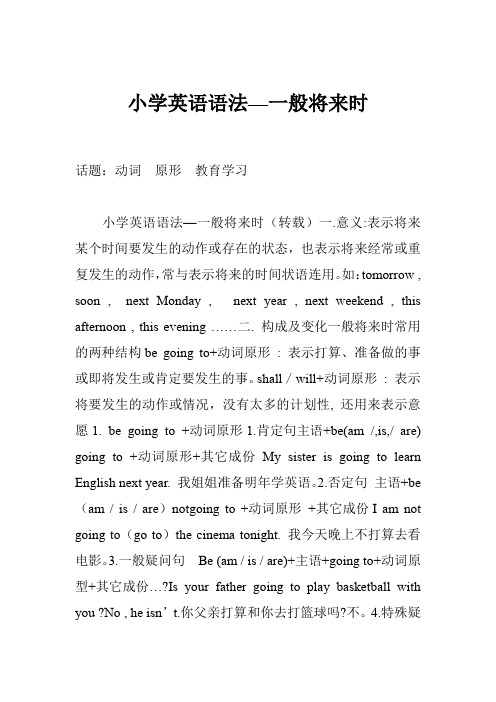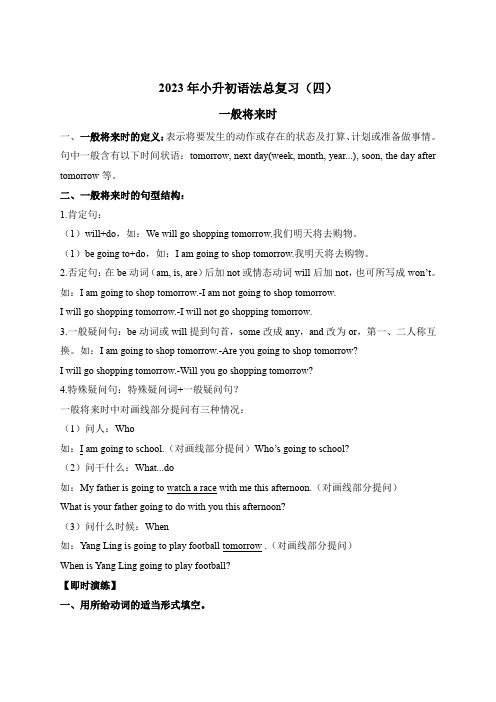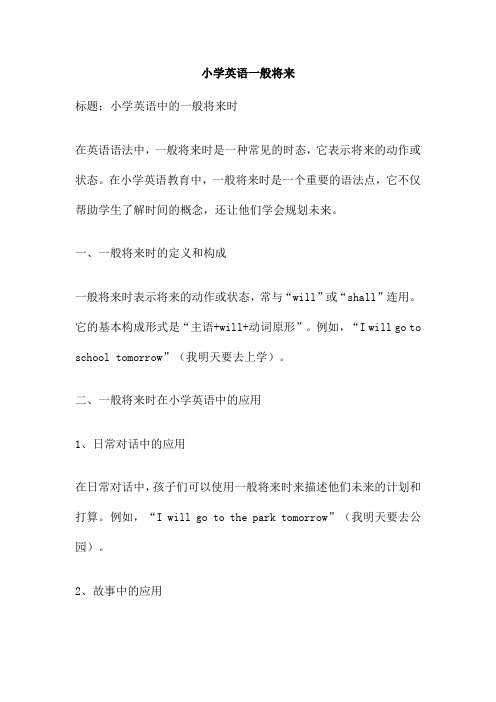小学英语语法一般将来时
小学英语语法—一般将来时

小学英语语法—一般将来时话题:动词原形教育学习小学英语语法—一般将来时(转载)一.意义:表示将来某个时间要发生的动作或存在的状态,也表示将来经常或重复发生的动作,常与表示将来的时间状语连用。
如:tomorrow , soon ,next Monday , next year , next weekend , this afternoon , this evening ……二. 构成及变化一般将来时常用的两种结构be going to+动词原形: 表示打算、准备做的事或即将发生或肯定要发生的事。
shall/will+动词原形: 表示将要发生的动作或情况,没有太多的计划性, 还用来表示意愿1. be going to +动词原形1.肯定句主语+be(am /,is,/ are) going to +动词原形+其它成份My sister is going to learn English next year. 我姐姐准备明年学英语。
2.否定句主语+be (am / is / are)notgoing to +动词原形+其它成份I am not going to(go to)the cinema tonight. 我今天晚上不打算去看电影。
3.一般疑问句Be (am / is / are)+主语+going to+动词原型+其它成份…?Is your father going to play basketball with you ?No , he isn’t.你父亲打算和你去打篮球吗?不。
4.特殊疑问句特殊疑问词(Wh-)+一般疑问句?Where are you going to spend Spring Fesital.? 春节你打算在哪过?5.注意: be going to 结构后面习惯上不跟go ,come 等表位移的动词,一般用该动词的进行时形式表示。
如: He’s going to New York next week.下周他要去纽约.2.will /shall +动词原形(在书面语中,主语是第一人称时,常用shall ,在口语中,所有人称都可以用will)1.肯定句主语+will/shall+动词原形+其它成份I (shall) write to him next week. 下周我将给他写信。
一般将来时-小学英语语法

I’m going to steal some shirts and jackets.
Where is the thief?
Where is he?
He is in the CLOTHES SHOP
Where is the thief?
He is in the CLOTHES SHOP
Where is the thief? Where is he?
He is in the BAKERY
Where is the thief?
I’m going to steal some beef and sausages.
Where is the thief?Where is he?
He is in the BUTCHER’S
What are you/they/we going to do ...?
The future with going to is used to express intention.
What is he/she/it going to do?
The future with be going to is used to express a plan for
He is in the NEWSAGENT’S
Where is the thief?
I’m going to steal some sculptures and paintings.
Where is the thief?
Where is he?
He is in the MUSEUM
Where is the thief?
simple future tense 一般将来时
2023年小学英语六年级小升初语法总复习(四)一般将来时 (译林版含答案)

2023年小升初语法总复习(四)一般将来时一、一般将来时的定义:表示将要发生的动作或存在的状态及打算、计划或准备做事情。
句中一般含有以下时间状语:tomorrow, next day(week, month, year...), soon, the day after tomorrow等。
二、一般将来时的句型结构:1.肯定句:(1)will+do,如:We will go shopping tomorrow.我们明天将去购物。
(1)be going to+do,如:I am going to shop tomorrow.我明天将去购物。
2.否定句:在be动词(am, is, are)后加not或情态动词will后加not,也可所写成won’t。
如:I am going to shop tomorrow.-I am not going to shop tomorrow.I will go shopping tomorrow.-I will not go shopping tomorrow.3.一般疑问句:be动词或will提到句首,some改成any,and改为or,第一、二人称互换。
如:I am going to shop tomorrow.-Are you going to shop tomorrow?I will go shopping tomorrow.-Will you go shopping tomorrow?4.特殊疑问句:特殊疑问词+一般疑问句?一般将来时中对画线部分提问有三种情况:(1)问人:Who如:I am going to school.(对画线部分提问)Who’s going to school?(2)问干什么:What...do如:My father is going to watch a race with me this afternoon.(对画线部分提问)What is your father going to do with you this afternoon?(3)问什么时候:When如:Yang Ling is going to play football tomorrow .(对画线部分提问)When is Yang Ling going to play football?【即时演练】一、用所给动词的适当形式填空。
小学英语一般将来

小学英语一般将来标题:小学英语中的一般将来时在英语语法中,一般将来时是一种常见的时态,它表示将来的动作或状态。
在小学英语教育中,一般将来时是一个重要的语法点,它不仅帮助学生了解时间的概念,还让他们学会规划未来。
一、一般将来时的定义和构成一般将来时表示将来的动作或状态,常与“will”或“shall”连用。
它的基本构成形式是“主语+will+动词原形”。
例如,“I will go to school tomorrow”(我明天要去上学)。
二、一般将来时在小学英语中的应用1、日常对话中的应用在日常对话中,孩子们可以使用一般将来时来描述他们未来的计划和打算。
例如,“I will go to the park tomorrow”(我明天要去公园)。
2、故事中的应用在故事中,一般将来时常常用来描述未来的事件和情境。
例如,“In the future, there will be no more cars”(未来将没有汽车)。
3、写作中的应用在写作中,孩子们可以使用一般将来时来描述未来的事件和情境。
例如,“In 10 years, I will be a doctor”(十年后,我将成为一名医生)。
三、如何教授一般将来时1、讲解语法规则老师需要讲解一般将来时的语法规则,包括它的构成形式、使用方法和注意事项。
通过讲解实例和练习题,让学生理解并掌握这个时态。
2、结合实际情境教学为了让学生更好地理解和应用一般将来时,老师可以结合实际情境进行教学。
例如,在讲解“will”和“shall”的区别时,老师可以让学生设想一个未来的情境,然后使用这两个词进行对话。
3、大量阅读和写作练习阅读和写作是帮助学生掌握一般将来时的有效方法。
通过大量的阅读和写作练习,学生可以更好地理解这个时态的用法,并且在实际语境中运用自如。
四、总结一般将来时是小学英语中的一个重要语法点,它帮助学生了解时间的概念,规划未来。
通过讲解语法规则、结合实际情境教学和大量阅读、写作练习,可以帮助学生更好地理解和应用这个时态。
小学英语语法时态一般将来时详解

小学英语语法时态一般将来时详解一、概念一般将来时表示将来某一时刻的动作或状态;或将来某一段时间内经常的动作或状态..一般将来时由助动词shall第一人称;will第二、三人称+动词原形构成..美国英语则不管什么人称;一律用will..二、一般将来时的形式●will 常简略为'll;并与主语连写在一起;如:I'll;he'll;it'll;we'll;you'll;they'll..●一般疑问句如用Will you…其简略答语须是Yes;I will或 No;I will not;如用 Shall you…较少见其简略答语须是 Yes;I shall.或 No; I shall not...三、一般将来时的用法1表示将来的动作或状态一般将来时常与一些表示将来的时间状语连用;如:tomorrow明天; next week 下周; from now on从现在开始;in the future将来等..2表示将来经常发生的动作..一般将来时表示将来某一时刻的动作或状态;其表达形式除了“shall第一人称;will第二、三人称+动词原形构成”外;还有以下几种形式..1“to be going to+动词原形”表示即将发生的或最近打算进行的事..例如:①It is going to rain. 要下雨了.. ②We are going to have a meeting today. 今天我们开会..2go;come;start;move;sail;leave;arrive;stay等可用进行时态表示按计划即将发生的动作;例如: I'm leaving for Beijing. 我要去北京..3“be to+动词原形”表示按计划要发生的事或征求对方意见..例如:①Are we to go on with this work 我们继续干吗②The boy is to go to school tomorrow.这个男孩明天要去上学..4“be about to+动词原形”表示即将发生的动作;意为:很快;马上..后面一般不跟时间状语..例如: We are about to leave.我们马上就走..5某些词;如come; go; leave; arrive; start; get; stay 等的一般现在时也可表示将来..①The meeting starts at five o'clock.会议五点开始..②He gets off at the next stop.他下一站下车四、一般将来时特点1shall用于第一人称;常被will 所代替..will 在陈述句中用于各人称;在征求意见时常用于第二人称..Which paragraph shall I read first Will you be at home at seven this evening2be going to +不定式;表示将来..a. 主语的意图;即将做某事..What are you going to do tomorrowb. 计划;安排要发生的事..The play is going to be produced next month..c. 有迹象要发生的事Look at the dark clouds; there is going to be a storm.3be +不定式表将来;按计划或正式安排将发生的事.. We are to discuss the report next Saturday.4be about to +不定式;意为马上做某事.. He is about to leave for Beijing.注意:be about to 不能与tomorrow; next week 等表示明确将来时的时间状语连用..五、一般将来时常见用法1、表示将要发生的动作..例如:I shall go to see a friend this evening.2、shall用于第一人称作主语的问句里;表示征求对方的意见或询问情况..例如:Shall I open the door3、will用于第二人称的问句里;征求对方是否愿意或表示客气的邀请或命令..例如:Will you please read the word4、be going to打算、准备做某事或即将发生的事..例如:We are going to plant trees.这种时态由be的将来时形式+现在分词构成..如主语为第一人称;除在疑问句外will要比shall更常用.可用做一般进行时;也可表示不含意图又未发生的动作..5、be to do按计划安排要发生的事或征求对方意见..例如:When is the swimming pool to open6、be going在go;come;leave;stay等按计划安排要发生的事中..这些动词经常具有趋向性..例如:They are leaving here tomorrow.。
小学五年级下册英语重点语法:一般将来时

◆ 一般疑问句:Be动词 + 主语 + going to+动原+其它?
如:Are they going to have an English test nexபைடு நூலகம் week?
他们下周有英语考试吗?
◆ 特殊疑问句:
特殊疑问词+ be动词 + 主语 +going to+动原+其它?
★一般将来时态的定义:
表示将要发生的动作或存在的状态。
如: I will see a film tomorrow.
我明天将去看一场电影。
He will be 10 years old next year.
明年他就十岁了。
★一般将来时态的标志词:
1、tonight(今晚)
2、soon(不久;很快)
3、tomorrow系列:tomorrow morning/afternoon/evening
the day after tomorrow(后天)
4、next系列:next week/ next year/ next Monday...
5、一段时间+later系列:five years later/ three days later…
6、in + 一段时间系列:in five minutes/in two weeks…
如:They are going to have an English test next week.
他们下周有一场英语考试。
◆ 否定句:主语 + be动词+ not +going to+动原+其它.
如:They aren't going to have an English test next week
小学英语语法专题一般将来时

When will they eat?
一般将来时
特殊疑问句:疑问词+will +主语 +动词原形+其它
She will swim in the sea.
Where will she swim?
一般将来时
特殊疑问句:疑问词+will+主语+ 动词原形+其它
Will he play football ?
一般将来时
一般疑问句:will提前 some 变any
She will run in the playground.
Will she run in the playground?
一般将来时
一般疑问句:will提前 some 变any
We will have a picnic in the park.
一般将来时
学习目标
构成
一般将 来时 时间标
用法 志词
情境导入
A:What are you going to do this afternoon? B:I 'm going to buy a book. C:I 'm going to the Great Wall.
知识讲解
Next year I’m going to … learn to play the piano
一般将来时
否定句:在will动词后 加not,有some变any I am gwoiilnl g to swim in the sea.
I am nwoitllgnooint g to swim in the sea.
will not=won’t
《漫画图解——超好记超好用小学英语语法》第十七章 一般将来时

130第十七章 一般将来时 什么是一般将来时?一般将来时表示将来某一时刻的动作或状态,或将来某一段时间内经常的动作或状态。
常用的基本形式有三种:will / shall 结构;be going to 结构;be about to结构1. 基本结构: 主语+will/shall+动词原形表示将来发生的事情或是主语将要发生的行为,也用于征求对方的意见或表示客气的邀请。
It will be sunny tomorrow. 明天将是个好天气。
(表示将来发生的状况)I will come back soon. 我很快就回来。
(表示主语将要发生的行为)Will you please open the window? 请你把窗打开,好吗?(表示征求对方的意见)Linda老师的小提醒★一般将来时任何主语都可以用will,但书面语中第一人称常用shall。
I shall study harder at English. 我将更加努力地学习英语。
Shall we go to see a film? 我们去看电影好吗?★will, shall和主语都可以缩写成’llI’ll fly to London.我要坐飞机去伦敦。
They’ll visit the museum tomorrow.他们明天要参观博物馆。
2. 一般疑问句: 将will/shall提到句首Will you go there?你要去那儿吗?1313. 否定句: 在will/shall 后加not, 可缩写成won ’t/shan ’t陈述句: I will go there. / I shall go there. 我要去那儿。
否定句: I won’t go there. /I shan’t go there. 我不去那儿。
4. 特殊疑问句: 特殊疑问词+ will/shall +主语+动词原形+其他?What will he do this evening? 今晚他准备做什么?(针对动词提问) When will you visit him? 你什么时候去拜访他?(针对时间提问)Where will they have a running race? 他们准备在哪里赛跑?(针对地点提问)be going to 表示主观的打算或计划,一般指近期或事先考虑过的将要发生的动作以及已有迹象表明必将发生某事,意为“打算,就要”。
- 1、下载文档前请自行甄别文档内容的完整性,平台不提供额外的编辑、内容补充、找答案等附加服务。
- 2、"仅部分预览"的文档,不可在线预览部分如存在完整性等问题,可反馈申请退款(可完整预览的文档不适用该条件!)。
- 3、如文档侵犯您的权益,请联系客服反馈,我们会尽快为您处理(人工客服工作时间:9:00-18:30)。
将来时理论及练习
一、概念:表示将要发生的动作或存在的状态及打算、计划或准备做某事。
句中一般有以下时间状语:tomorrow, next day(week, month, year…),soon, the day after tomorrow(后天)等。
二、基本结构:①be going to + do;
②will+ do.
三、否定句:在be动词(am, is, are)l后加not或情态动词will后加not成won’t。
例如:I’m going to have a picnic this afternoon.→ I’m not going to have a picnic this afternoon.
四、一般疑问句:be或will提到句首,some改为any, and改为or,第一二人称互换。
例如:We are going to go on an outing this weekend. → Are you going to go on an outing this weekend?
五、对划线部分提问。
一般情况,一般将来时的对划线部分有三种情况。
1. 问人。
Who 例如:I’m going to New York soon. →Who’s going to New York soon.
2. 问干什么。
What … do.例如:My father is going to watch a race with me this
afternoon. →What is your father going to do with you this afternoon.
3. 问什么时候。
When.例如:She’s going to go to bed at nine. →When is she going
to bed?
六、同义句:be going to = will
I am going to go swimming tomorrow(明天). = I will go swimming tomorrow.
练习:
填空。
1. 我打算明天和朋友去野炊。
I_____ _______ _________ have a picnic with my friends.
I ________ have a picnic with my friends.
2. 下个星期一你打算去干嘛我想去打篮球。
What ________ ________ _________ _________ _________ next Monday I _______ ______ _____ play basketball.
What _________ you do next Monday I ________ play basketball.
3. 你妈妈这个周末去购物吗是,她要去买一些水果。
_____ your mother _______ ________ go shopping this ___________
Yes, she _________. She ______ ________ __________ buy some fruit.
4. 你们打算什么时候见面。
What time _______ you _________ __________ meet?
改句子。
5. Nancy is going to go camping.(改否定)
Nancy ________ going to go camping.
6. I’ll go and join them.(改否定)
I _______ go ______ join them.
7. I’m going to get up at 6:30 tomorrow.(改一般疑问句)
________ _______ ________ to get up at 6:30 tomorrow?
8. We will meet at the bus stop at 10:30.(改一般疑问句)
_______ ________ meet at the bus stop at 10:30.
9. She is going to listen to music after school.(对划线部分提问)
________ _______ she ________ ________ _________ after school?
10. My father and mother are going to see a play the day after tomorrow.(同上)
_________ _________ going to see a play the day after tomorrow.
用所给词的适当形式填空。
11. Today is a sunny day. We ___________________ (have) a picnic this afternoon.
12. My brother _______________ (go) to Shanghai next week.
13. Tom often ______________(go) to school on foot. But today is rain. He ______________ (go) to school by bike.
14. What do you usually do at weekends I usually __________ (watch) TV and ____________(catch) insects
15. It’s Friday today. What _____she _________ (do) this weekend She ______________ (watch) TV and _____________ (catch) insects.
16. What ___________ (d0) you do last Sunday I ____________ (pick) apples on a farm. What ______________ (do) next Sunday I ______________ (milk) cows.
17. Mary ____________ (visit) her grandparents tomorrow.
18. Liu Tao ____________ (fly) kites in the playground yesterday.
19. David ______________ (give) a puppet show next Monday.
20. I ________________ (plan) for my study now。
